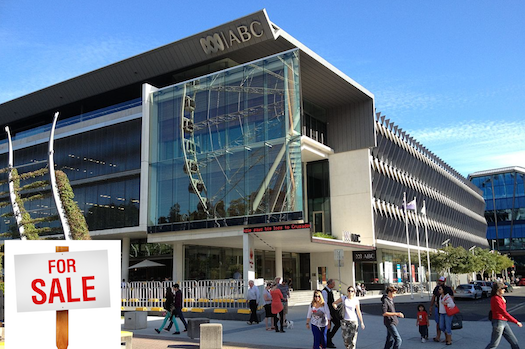Comment from Peter Saxon now unlocked.
When a media reform package was first raised in parliament by Communications Minister, Mitch Fifield, the idea was to bring regulation in line with the commercial realities of the 21st Century. There was no mention of the ABC.
The national broadcaster seemed in no danger of the likes of facebook or Google eating its lunch because, for Aunty, commercial revenue is not a factor. Which is exactly what the founding fathers intended when they drafted the ABC charter.
For the commercial sector, however, the imperative to reform was so pressing that in an historic moment they were all on the same page despite their many competing interests.
“Canberra is an interesting place,” Grant Blackley
As SCA CEO Grant Blackley told me the night before the Senate passed the bill, “Not everyone can win. Not everyone can get what they want. But there’s a coalition of people that have fundamentally got together for the common good of reform. That’ll mean that certain people won’t like certain aspects – that could be the ABC, SBS or Southern Cross Austereo. It could be the Nine or Seven Networks or Fairfax. What we’re saying is the broader components of the package and the collective weight of that should carry through.”
The biggest loser, it seems, is the ABC which must be wondering how it got sucked into a fight in which it thought it had no dog at all.
Once the initial reform package, based on a sound business case was agreed upon by the commercial sector, the entered the murky realm of politics. “Canberra is an interesting place,” remarked Mr Blackley. A fortune cookie could not have expressed it better.
At first count, The Liberal government was for it, Labor and the Greens against. To get the legislation passed in the Senate they needed 12 out of the 14 independents. Initially, the stumbling blocks were Nick Xenophon’s NXT party which controlled three votes and Pauline Hanson’s One Nation which held four.
Xenophon proposed a number of positive amendments, in particular those that would encourage more local news and content in regional markets. With NXT on board, only two more votes were needed, Hanson held four: all of them aces.
And that’s when she went “all in” and bet the ABC. If the commercial sector wanted her party’s vote to get what they wanted, she was going to get what she wanted. What she wanted was more control over the ABC. Well, which political party doesn’t?
Some of the amendments Ms Hanson put up seem quite reasonable. The community sector is thrilled with the extra $12 million in funding that the Hanson package provides. And even her insistence that salaries of those earning above $200,000 at the ABC be made public has some merit in that we are all shareholders of this most public of broadcasters. And if ARN and SCA has to show shareholders theirs, Aunty should show us hers. In any case, it can’t be too onerous since we all seem to know hat the top earners earn anyway.
The sticking point is that Ms Hanson wants to legislate for the ABC to be more “Fair and Balanced.” Plus she wouldn’t mind making some cuts to the ABC’s funding.
“You are better than this dirty deal that has been done at the 11th hour.” Dastyari to Xenophon
The inclusion of the Hanson ABC package caused Tasmanian independent Senator Jacqui Lambie who was, up until then for the bill, to deliver this scathing attack on her fellow law makers, calling the decision “crap.”
MUST WATCH. “You are a disgusting bunch of individuals” @JacquiLambie tells it like is about those who'd hurt the ABC. #auspol pic.twitter.com/PL6jKhTI8V
— Peter Martin (@1petermartin) September 13, 2017
Labor’s Sam Dastyari echoed her sentiments yelling across the chamber at Senator Xenophon for negotiating a “dirty deal” with the government. “You are better than this dirty deal that has been done at the 11th hour. You are enabling what will be a funding cut to the ABC, what will be an attack on the ABC.”
The problem with making the ABC or Fox News for that matter, more Fair and Balanced is who gets to decide what fair and balanced is, Pauline Hanson?
Conservative media, they argue, is privately funded whereas the ABC runs on tax payers’ money
In reality you, gentle reader, and I are the only two people in all of Australia who are unbiased ( and I have to check with my wife about my opinion first). Anything to the left of us is, well, left. And to the right… you get the picture.
Nonetheless, most will agree that if you had to place the ABC into a map of the Australian media landscape, then compared to MacRadio and the News Corp outlets, it would have to be considered left wing.
When media bias is discussed, sensibly, with hackles down, conservatives usually agree that the media they consume is just as biased as the ABC. But conservative media, they argue, is privately funded whereas the ABC runs on tax payers’ money – much of it from conservative tax payers who loathe the ABC almost as much as they loathe those who listen to it or watch it.
A common catch-cry from the right is that the ABC should be sold off to private enterprise. That way it would become a contributor to government coffers rather than a drain.
Sounds great in theory. How would that go in practice?
Provided they didn’t pay too much, it would be a boon for the buyer.
For other commercial media, however, it would be a disaster. A new competitor, that size, that covers all of Australia would siphon perhaps 30% from the total national advertising spend.
As for consumers hoping that the ABC would become less biased, it is unlikely that the new owners would make it any less liberal in it’s leanings. After all, the ABC is the most trusted media brand in Australia, it would be madness to mess with it.
Trying to make the ABC “fair and balanced” is impossible because there is no universally accepted benchmark for it.
In the end, though, the Australian public would be the poorer for having their ABC commercialised. In reality its charter says less about being fair and balanced than being free of commercial obligations. And for good reason.
The vast majority of ABC content is politically neutral. It is content like Dr Who and Ian McNamara’s Australia All Over that the founding fathers wanted to protect from the commercial reality of sometimes having to pander to the lowest common denominator in a quest for ratings.
Trying to make the ABC “fair and balanced” is no more possible than for commercial broadcasters because there is no universally accepted benchmark for it.
If the ABC were to be privatised it would make it less accountable for its ideology but just as accountable for truth and accuracy as its commercial counterparts through the Australian Communications and Media Authority (ACMA.) The ACMA is already the arbiter of last resort when the ABC’s internal complaints structure fails.
I’m not suggesting that the ABC doesn’t strive to get the story right but it doesn’t get it right every time. And sometimes a little fudging goes on in order to push a idealogical barrow.
Here’s a case in point. Recently, a friend sent me an article from a website called Honest Reporting.
The website claimed that on August 10, The World Today program interviewed a representative from Oxfam on the topic of Gaza’s electricity crisis.
While the interview on ABC radio stated, “The Israeli government cut electricity supply to the Gaza Strip at the request of the West Bank-based Palestinian Authority,” the transcript of the interview that later appeared on the ABC website only said that “The Israeli government cut electricity supply to the Gaza Strip.” No mention of the request from the Palestinian Authority. By editing out this vital piece of context, the transcript now implied that Israel had acted alone and that the Palestinian Authority shared no complicity.
The ABC site invited feedback, so I posted the following
Hi, I read a report about selective editing on your program at http://honestreporting.com/trashing-a-transcript-to-implicate-israel/
Firstly, is the report from the website above accurate? If so, no doubt, you have had a good reason for changing the transcript from that which was recorded in the original interview. In light of the proposed media reforms that will legislate for “fair and balanced” reporting from the ABC will that likely have an impact on the ABC’s reporting in general and on the Middle East in particular?
Kind regards,
Peter Saxon, Managing Editor
www.radioinfo.com.au
The disclaimer on the World Today site stated it I could take up to four weeks for me to receive a reply. That was about four weeks ago and I’m still waiting.
If the ABC had’ve been answerable to the ACMA, it would already be in breach.
I know this might sound a small thing but it goes to the core of journalistic integrity.
Having an opinion is one thing, altering facts to suit is another. It is a betrayal of trust, particularly when published on an outlet that is so trusted by the public to tell the truth as the ABC. And if someone seems to have deliberately falsified, by omission, a report to further their personal ideology, then they and management should be subject to an independent investigation in the same way that commercial radio is.
Regardless of the merits of the case, if the ABC is answerable to the ACMA, it would already be in breach if it doesn’t repond to my complaint in a timely and appropriate manner.
More importantly, it would be on a level playing field with other electronic media in matters of truth and accuracy.
Note: This article was first published on 18 September, 2017 and has been slightly updated by the author who is still waiting on a reply from the ABC.

Peter Saxon

